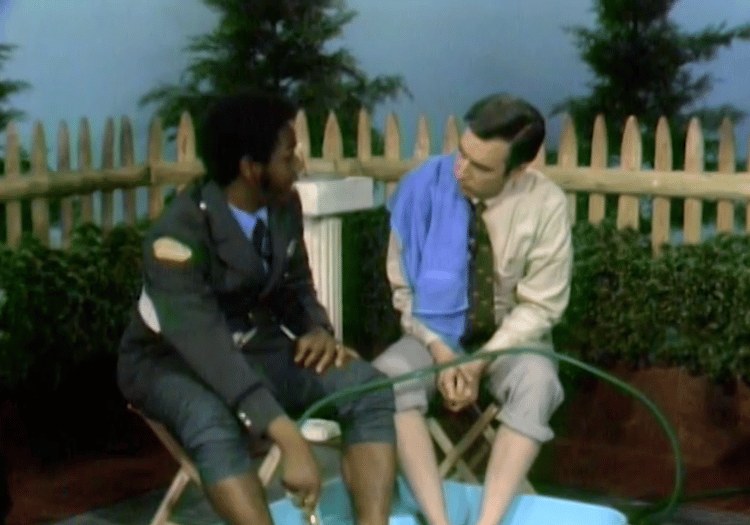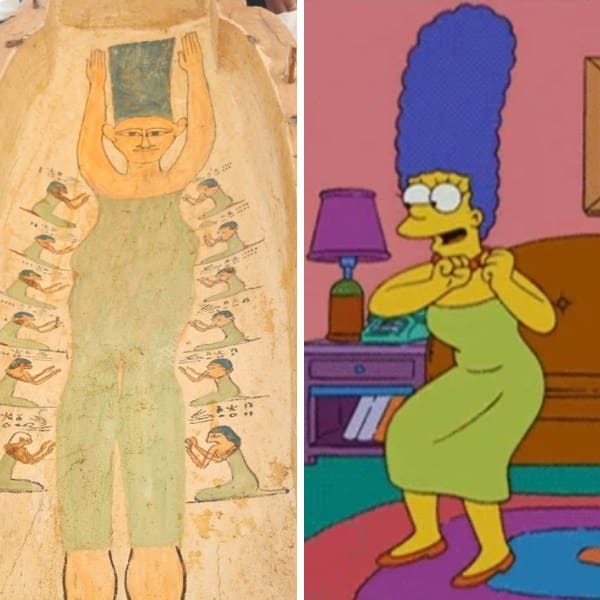
Photo: Mister Rogers' Neighborhood
At the end of the 1960s, Black people in America were still excluded from places of relaxation and recreation like public swimming pools due to discriminatory segregation practices. In his beloved his children’s program, Mister Rogers’ Neighborhood, Fred Rogers addressed this huge issue in a subtle but incredibly smart and meaningful way. In episode 195 broadcast on May 9, 1969, Rogers, a white man, soaks his feet in a small pool. When Officer Clemmons, a Black police officer, comes by for a visit, Rogers invites him to join him poolside. “It’s so warm, I was just putting some water on my feet,” Rogers tells Clemmons. “Would you like to join me?”
Officer Clemmons seems, at first, hesitant to take up Rogers' offer. He responds by saying how enjoyable the water looks. “But I don’t have a towel or anything,” Clemmons says, and Rogers reassures him that he can share his own towel. “Okay, sure,” a beaming Clemmons replies. He then takes off his shoes and socks and puts his feet beside Rogers in the small pool. The two men wash their feet together for viewers all over the country to witness. This small act on public television embarked the big job of challenging racial stereotypes and sending a very clear message to the world. “Around the country, they didn’t want Black people to come and swim in their swimming pools, and Fred said, ‘that is absolutely ridiculous,’” explains François Clemmons, who played Officer Clemmons.
The scene from this episode is disarmingly simple with two men sharing time together as they cool off on a warm day. Despite, or even because of, the politics of the time, Rogers and Clemmons were really showing people across the country that a Black man and a white man could sit side by side and share not only the same water but also the same towel to dry their feet. This casual gesture of warmth and friendship effectively highlights the narrow and discriminatory politics of the time that denied Black people access to swimming pools, leisure opportunities, and other places in society.
The Civil Rights Act came into being in 1964, but public spaces at the time of the episode were still challenging for Black people to enter, because of white prejudice. Segregation was no longer legal, though many white people were still resistant to the new laws that were inclusive of Black people in public spaces. A year before the episode aired, Martin Luther King had been assassinated and racial tensions in the country were on the rise.
Clemmons speaks about his experience on the show and Rogers' attitude to race. “My being on the program was a statement for Fred,” he explains. “I have always felt a policeman is going to be the most dangerous person in the neighborhood, so to have me playing a police officer, I was tremendously hesitant. But there was something reluctant about Fred, to let go. And I said ‘Mr. Rogers, I would be very happy to be on your program, as long as it doesn't interfere with my singing.'”
Clemmons, a trained opera singer, worked together with Rogers on Mister Rogers’ Neighborhood for 25 years. He made a final appearance on the show in 1993, during which he and Rogers recreated the pool scene, and Clemmons sang “Many Ways To Say I Love You.” In this episode, Rogers made an even more significant gesture; he took the towel and dried Clemmon’s feet himself.
In an episode of Mister Rogers’ Neighborhood, Fred Rogers challenged the segregation of the 1960s by inviting Officer Clemmons, a Black police officer on the show, to share a pool with him.
The iconic pool scene was recreated in 1993 at Clemmons’ last appearance on the show, during which he sang “Many Ways to Say I Love You.”
Mister Rogers' Neighborhood: Website | Facebook
Related Articles:
7-Foot-Tall Mister Rogers Statue Commemorates the Beloved Children’s TV Host
This Chart Tracks All of Mister Rogers’ Cardigans Worn From 1969 to 2001
28 Inspiring Mister Rogers Quotes That Can Make Any Day a “Beautiful Day in the Neighborhood”






















































































